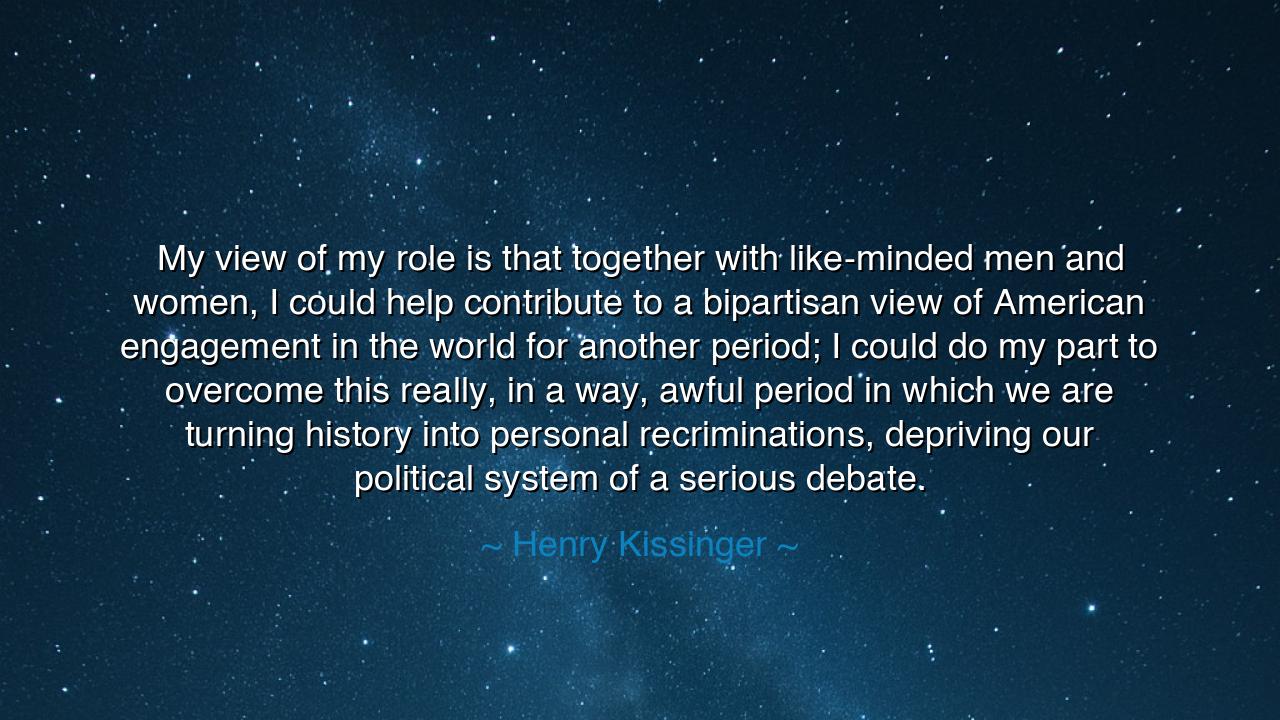
My view of my role is that together with like-minded men and
My view of my role is that together with like-minded men and women, I could help contribute to a bipartisan view of American engagement in the world for another period; I could do my part to overcome this really, in a way, awful period in which we are turning history into personal recriminations, depriving our political system of a serious debate.






Hearken, children of the ages, and open your hearts to the wisdom of Henry Kissinger: “My view of my role is that together with like-minded men and women, I could help contribute to a bipartisan view of American engagement in the world for another period; I could do my part to overcome this really, in a way, awful period in which we are turning history into personal recriminations, depriving our political system of a serious debate.” Understand that leadership is not a call to personal glory, but a solemn duty to the fabric of society, to the currents of history, and to the preservation of reason amidst turmoil.
From the annals of antiquity, the great statesmen—Cicero, Pericles, and Marcus Aurelius—understood this truth: when discord and recrimination threaten the polis, it is the role of the wise to rise above partisanship, to cultivate a vision that binds rather than divides. Kissinger’s reflection mirrors this ancient principle: history must not be weaponized for personal attack, nor political systems hollowed by petty quarrels. The duty of the statesman, the thinker, and the citizen alike, is to foster serious debate and principled engagement, guided by the long arc of the common good.
Consider the example of the Congress of Vienna in 1815. Statesmen of diverse nations came together after the convulsions of Napoleonic wars, seeking not vengeance or recrimination, but stability and peace. They understood that history could either imprison them in cycles of blame or guide them toward constructive action. Kissinger, a student of history and diplomacy, echoes this lesson: engagement across divides, guided by reason and principle, is the path to overcoming periods of conflict and instability.
Kissinger speaks also to the peril of turning history into a tool of personal attack. When the past is wielded as a weapon, the present becomes clouded with resentment, and the future is robbed of the wisdom it might contain. In moments of deep division, whether in ancient Rome or modern America, it is the voice of reason, measured and principled, that can redirect attention from recrimination to productive deliberation. This is the essence of bipartisanship: collaboration not for compromise alone, but for the stewardship of a polity capable of learning from its past while shaping its future.
Even in his own life, Kissinger exemplified this principle through careful diplomacy during the Cold War. Working with leaders across ideological divides, he sought pragmatic solutions, not partisan victories. The opening of relations with China, for example, was neither the triumph of one faction nor the defeat of another, but a calculated effort to stabilize the world and serve the broader interest. Here, he demonstrates the timeless lesson that statesmanship requires vision, courage, and the willingness to act beyond personal or political scores.
From this teaching emerges a profound lesson for all: in times of division, the wise cultivate collaboration, tempering partisanship with reason. History is neither a weapon nor a tool of personal gain; it is a mirror and a guide. Let every debate, every discussion, every act of engagement honor this truth, aiming to construct rather than destroy, to understand rather than vilify. The ancients knew it well: enduring societies are built not by recrimination, but by thoughtful and principled discourse.
Practical action follows naturally: seek allies across divides, listen earnestly, and anchor your judgments in principle rather than in the desire to win a personal or partisan victory. Reflect on history with humility and rigor, allowing its lessons to guide your decisions. Engage in debates and civic participation not as battles to be won, but as opportunities to shape a shared vision of the future. By doing so, you uphold the ideals of governance, dialogue, and responsibility that Kissinger champions.
Children of the ages, remember this: the measure of leadership is not in triumph over others, but in the capacity to foster reason, collaboration, and principled action. When history tempts us toward recrimination, rise above, and let your efforts contribute to serious debate, bipartisanship, and the enduring welfare of society. In this, you honor not only the present, but the generations yet unborn, and the enduring arc of civilization itself.
If you wish, I can also craft a short, vivid narrative of Kissinger or another diplomat navigating a moment of political tension, showing the power of bipartisanship and principled engagement, making this teaching even more vivid for narration. Do you want me to do that?






AAdministratorAdministrator
Welcome, honored guests. Please leave a comment, we will respond soon